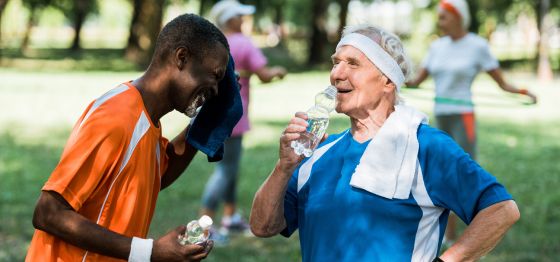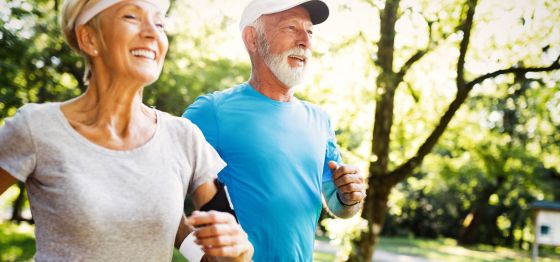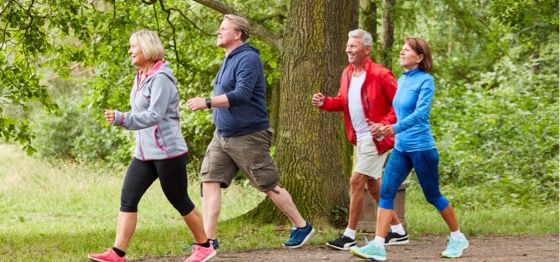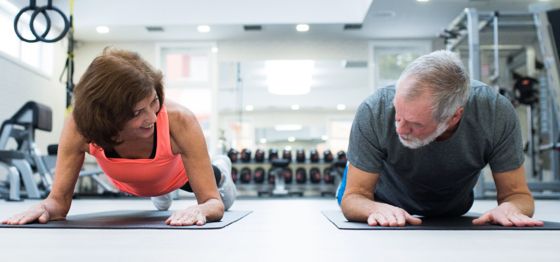“Dehydration” is the lack of fluids necessary for proper, healthy function of almost all of the human body’s systems. Drinking fluids is necessary for joint lubrication, heart health and much more.1 Dehydration may lead to mild or severe health complications that include heat stroke, urinary tract infections (UTIs), blood clot complications, seizures and kidney failure.2 Not drinking enough fluids may also affect cell health by reducing the body’s ability to heal after an injury or prevent infections.3
Risks for dehydration in older adults
While anyone can experience it, older adults may have a greater risk for dehydration for a variety of reasons, including:4
- Diarrhea and vomiting—may lead to dehydration due to a huge loss of water, electrolytes and minerals—especially if they occur suddenly, severely and at the same time.
- Fever—the higher the fever, the faster it may lead to dehydration. The problem may get even worse if the fever is accompanied by diarrhea and vomiting.
- Excessive sweating—water is lost through sweat during strenuous activities like exercising or doing yardwork, especially during hot, humid weather. If that lost water isn’t replaced while those activities are going on, dehydration may occur.
- Increased urination—seniors with undiagnosed or uncontrolled diabetes often urinate more, depleting their precious bodily fluids, which may lead to dehydration. Some blood pressure medications and diuretics can also cause older adults to urinate more and become dehydrated.
Why seniors are more vulnerable to dehydration
According to a recent study by the University of California, Los Angeles School of Nursing, up to 40% of older adults may be chronically underhydrated.5 There are several reasons why seniors are more vulnerable to dehydration.6
- The body’s thirst response may lessen with age. So even when their bodies crave water, older adults may not realize it, drinking less than their bodies really need.
- Total body fluid may decrease as people get older, so there are fewer fluid reserves to draw upon to keep systems running smoothly.
- Kidney function may decline leading to more water being lost through urination.
Also, research has shown that seniors’ bodies aren’t as efficient at regulating temperature as the bodies of younger people.7 So, when older adults exercise or engage in strenuous everyday activities, they’re more likely to dehydrate through sweating.
Symptoms of dehydration in older adults
There are signs and symptoms of dehydration for seniors to be aware of. Early ones include:8
- Dark-colored urine
- Fatigue
- Weakness
- Irritability
- Dizziness
- Muscle cramps
- Confusion or decrease in cognitive function
More serious symptoms of dehydration may require immediate medical attention:9
- Rapid heart rate
- Trouble with movement or walking
- Fainting
- Confusion or disorientation
- Diarrhea or vomiting lasting longer than 24 hours
Plus, dehydration can lead to these complications if ignored or left untreated:10
- Urinary tract infections (UTIs), kidney stones or kidney failure
- Seizures brought on by decreased electrolytes
- Heat exhaustion or heatstroke
- Hypovolemic shock, a life-threatening drop in blood pressure and oxygen levels due to low blood volume
How much water do older adults need?
According to the American Heart Association, the amount of water that older adults need can vary, depending on a variety of factors.11 One way to determine a personal amount is to take one third of their body weight and drink that many ounces of water per day. For example, 150 pounds = 50 ounces.12
To accurately determine what’s right for them, however, it’s best for seniors to talk to their doctor, who can review the patient’s medical history, as well any prescription drugs that may affect their ability to retain fluids. The doctor can also take into account any medical conditions, like cystic fibrosis, which may make a senior patient more likely to experience dehydration.
5 ways to prevent dehydration in seniors
Here are several simple things older adults can do to maintain healthy fluid levels.13
- Make hydration a part of the daily routine—drinking water at certain times of the day can help older adults build a healthy habit that contributes to a healthy, active life.
- Keep water close by—an easy-to-carry, refillable water bottle can go anywhere, making it easy for older adults to stay hydrated during the day.
- Add variety—slices of fresh fruit or berries can make ordinary water tastier and more enjoyable. Sports drinks or protein shakes are other good alternatives.
- Eat water-rich food—watermelon, cucumbers, strawberries, lettuce, celery and tomatoes are all great sources of the fluid that healthy older adults need each day.
- Cut out or cut down on alcohol—alcoholic drinks are diuretics that remove fluids from the body. Avoiding them keeps more water where it belongs.
Go365 by Humana® makes wellness fun and easy. We help Humana Medicare members with Go365® on their plan reach health goals, as well as take care of their physical and emotional health—allowing members to thrive at any age.
Humana Medicare members with Go365 on their plan can enroll in Go365 at
Go365 is a well-being and rewards program for many Humana Medicare Advantage members. Rewards have no cash value and can only be redeemed in the Go365 Mall. Rewards must be earned and redeemed within the same plan year. Any rewards not redeemed by December 31st will be forfeited.
If you need to enroll in Medicare Advantage or change your plan outside of the usual Medicare Annual Election Period, a Special Election Period (SEP) could be the answer. For information on eligibility, visit Humana’s
To learn more about Humana Medicare Advantage, call to speak with a licensed Humana sales agent at 1-844-321-5843 (TTY:711), Monday – Friday, 8 a.m. – 8 p.m. local time or visit
Sources:
1Jessica Migala, “7 Health Benefits of Water Backed by Scientific Research,” Everyday Health, last accessed March 24, 2023,
2“The Causes and Symptoms of Dehydration in Older Adults,” Healthline, last accessed March 24, 2023,
3“How to Stay Hydrated for Better Health,” National Council on Aging, last accessed March 24, 2023,
4"What to Know About Dehydration in Older Adults," WebMD, last accessed March 23, 2023,
5Andrew Porterfield, “Study finds a lack of adequate hydration among the elderly,” UCLA Newsroom, last accessed March 15, 2023,
6"The Causes and Symptoms of Dehydration in Older Adults."
7Robert D. Meade, et al, “Aging attenuates the effect of extracellular hyperosmolality,” Journal of Physiology, last accessed March 15, 2023,
8"How to Stay Hydrated for Better Health."
9"The Causes and Symptoms of Dehydration in Older Adults."
10"What to Know About Dehydration in Older Adults."
11"How to Stay Hydrated for Better Health."
12“Staying Hydrated – Staying Healthy,” American Heart Association, last accessed March 15, 2023,
13"How to Stay Hydrated for Better Health."
Consult your doctor before beginning any new diet or exercise regimen.
This information is provided for educational purposes only. It is not to be used for medical advice, diagnosis or treatment. Consult your healthcare provider if you have questions or concerns.
Go365 is not an insurance product and is not available with all Humana health plans. This is a general description of services which are subject to change. Product features may vary by client. Please refer to Customer Support for more information.
Humana is a Medicare Advantage HMO, PPO and PFFS organization with a Medicare contract. Humana is also a Coordinated Care plan with a Medicare contract and a contract with the state Medicaid program. Enrollment in any Humana plan depends on contract renewal.






